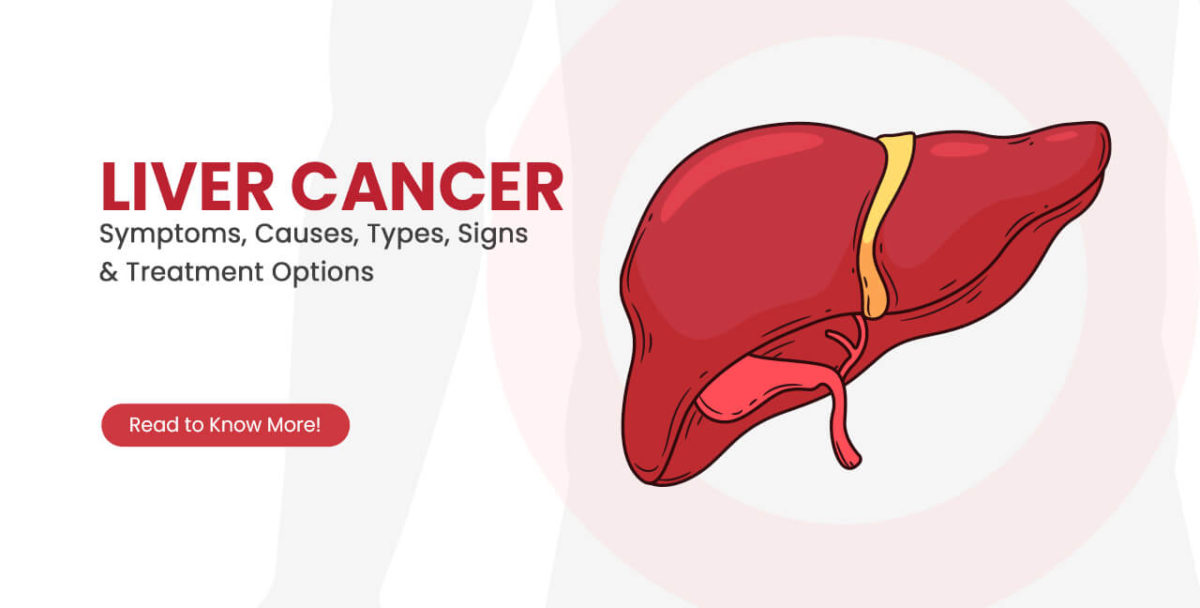
Liver cancer is a serious illness and one of the most rapidly developing cancer kinds all over the world. Liver cancer is classified into two types: primary and secondary. Primary cancer starts in the liver while secondary cancer spreads to the liver from another section of the body. In the following sections, we’ll discuss primary cancer in detail.
What are the symptoms of Liver Cancer?
When liver cancer is in its early stages, you may experience no symptoms at all. Hepatocellular carcinoma (HCC) and intrahepatic cholangiocarcinoma (IHC) share similar symptoms: So, What are the symptoms of liver cancer?
- A lump under your rib cage, pain on the right side of your abdomen, or discomfort near your right shoulder.
- Jaundice is a disorder in which the skin and eyes turn yellow.
- Unexpected weight loss, sickness, or loss of appetite.
- Fatigue.
- Urine in a dark colour.
What are the Causes of Liver Cancer?
Our DNA contains the genes that tell our cells how to function. We all have genes that determine when cells should grow, reproduce, and die. Oncogenes, for example, promote cell proliferation and division. Other genes, known as tumour suppressor genes, regulate cell activity, preventing cells from proliferating uncontrolled and ensuring cells die when they should. Liver cancer develops when something damages the DNA of healthy liver cells.
When our DNA mutates, our cells receive new instructions. In HCC, DNA alterations activate oncogenes and/or inhibit tumour suppressor genes. For example, studies reveal that cirrhosis caused by the hepatitis B virus (HBV) and the hepatitis C virus (HCV) accounts for more than half of all HCC cases. When these viruses infect liver cells, they alter their DNA, transforming healthy liver cells into malignant ones.
Stages of Liver Cancer
1. Stage I (very early stage/stage 0): You have a solitary tumour in your liver that is less than 2 centimetres. Blood testing shows that your bilirubin level is normal.
2. Stage II/early stage/stage A: You have a single tumour that is 5 cm or smaller, or you have many tumours that are less than 3 cm. The tumour may have migrated to your blood vessels.
3. Stage III/intermediate stage/stage B: At this time, you may have multiple tumours and/or one that is larger than 5 cm. The tumour could have progressed to your lymph nodes, big blood arteries, or other organs.
4. Stage IV/advanced stage/stage C: Cancer has spread to other parts of your body, such as your lungs or bones, as well as lymph nodes.
Treatment for Liver Cancer
Doctors will offer a variety of conventional therapies for HCC and IHC, including surgery to remove a portion of your liver, liver transplantation, and liver-directed treatments such as hepatic artery embolisation and ablation. They may also employ various forms of chemotherapy, chemoembolization, radiation treatment, radioembolization, immunotherapy, and targeted therapy.
Primary liver cancer is a serious illness. People frequently discover they have liver cancer after it has progressed to an advanced stage, limiting treatment options. When this occurs, Doctors focus on therapies that alleviate symptoms and slow cancer growth while allowing you to retain your quality of life. If you have any of the above-mentioned symptoms, talk to your doctor about your treatment options, including advantages and side effects, so you can make an informed decision about your next steps.

 Call-an-Ambulance
Call-an-Ambulance



